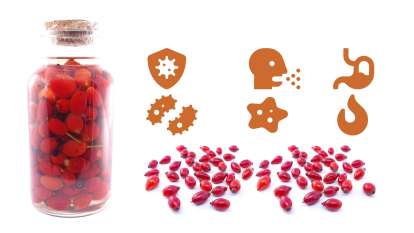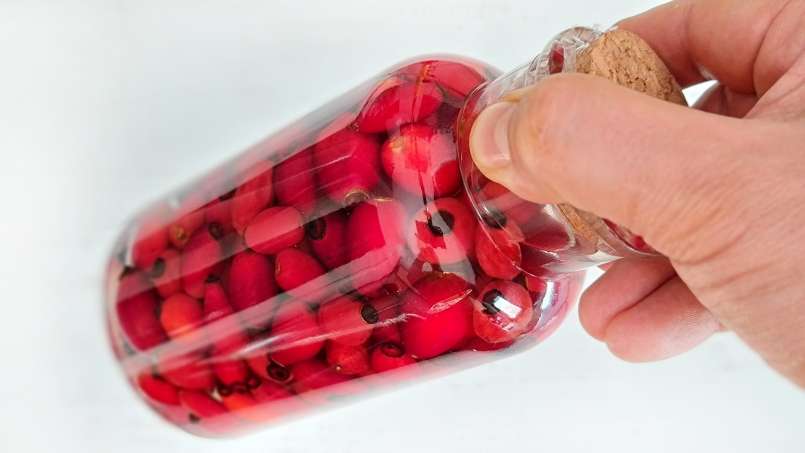Tincture of fresh, whole rosehip fruit in alcohol
Preparation time5 min
Waiting time45 days
Ready in45 days 5 m
General tonic, strengthens immunity, has a sedative effect, fights inflammatory and bacterial processes!
Alcoholic tincture of rosehip supports the cardiovascular system, peripheral circulatory system, digestive system, respiratory system, fights colds and flu, supports the urogenital system, osteo-articular system and is an adjunct in metabolic and endocrine diseases.
Servings: 166 servings
~ 250 ml of alcoholic rosehip tincture is obtained, ie ~ 166 servings of 30 drops each (1.5 ml)
Ingredients
Materials
- 500 ml jar
Preparation
 Wash the rosehips well (we will use them whole), then let them dry on a paper towel for ~ 15 minutes (to remove the excess water).
Wash the rosehips well (we will use them whole), then let them dry on a paper towel for ~ 15 minutes (to remove the excess water). Add fresh rose hips to a jar.
Add fresh rose hips to a jar. We pour the alcohol over the rosehips, the rosehips must be covered by alcohol.
We pour the alcohol over the rosehips, the rosehips must be covered by alcohol. We close the jar with a lid and leave it to macerate for at least 45 days in places away from light and air. During maceration, it is recommended to shake the jar at least once a day.
We close the jar with a lid and leave it to macerate for at least 45 days in places away from light and air. During maceration, it is recommended to shake the jar at least once a day.
→ At the end we filter the obtained tincture and eventually, we can leave it to decant in the fridge for another 3-7 days for a complete clarification. We will use only the clear part, removing any residue deposited on the bottom of the vessel.
→ We will store the tincture in small, dark bottles and ideally with a drip to avoid contact with air and light.
→ Consumption is recommended within 2 years of preparation.
Administration
→ It is recommended to shake the tincture before use, especially if deposits are observed during storage.
→ Internally, 30 drops (~ 1.5 ml) are recommended 3 times a day, diluted in a little boiled and cooled water (~ 50 ml), 30 minutes before meals.
⚠ Cures of up to 2 weeks with breaks of 2 weeks are recommended.
⚠ Being an alcoholic solution of high concentration / strength, rosehip tincture will not be consumed as such, but only diluted or in composition with other foods that will cut them from strength:
→ Internally, 30 drops (~ 1.5 ml) are recommended 3 times a day, diluted in a little boiled and cooled water (~ 50 ml), 30 minutes before meals.
⚠ Cures of up to 2 weeks with breaks of 2 weeks are recommended.
⚠ Being an alcoholic solution of high concentration / strength, rosehip tincture will not be consumed as such, but only diluted or in composition with other foods that will cut them from strength:
- diluted in distilled water (boiled and cooled water: ~ 50 ml);
- diluted in lukewarm teas;
- mixed in a teaspoon of honey;
- on a piece of dry bread;
- on a sugar cube;
Observations
In general, the minimum ratio of fruit to alcohol for the preparation of the tincture is 20% fruit and 80% alcohol.
In my case, I used whole rosehips and I used equal percentages of 50% rosehip and 50% alcohol.
⚠ Rosehips contain a huge amount of vitamin C (ascorbic acid), and this, in an alcoholic agent, is completely absorbed.
Composition of rosehip tincture in alcohol
In my case, I used whole rosehips and I used equal percentages of 50% rosehip and 50% alcohol.
⚠ Rosehips contain a huge amount of vitamin C (ascorbic acid), and this, in an alcoholic agent, is completely absorbed.
Composition of rosehip tincture in alcohol
- beta carotene
- minerals
- vitamin K
- organic acids
- tocopherol
- tannins
- riboflavin
- thiamin
- flavonoids
- folic acid
- iron
- manganese
- magnesium
- potassium
- copper
- zinc
- calcium
- phosphorus
Effects and benefits
Supports the cardiovascular system:
- improves heart function;
- strengthens the heart muscle;
- strengthens blood vessels
- increases the elasticity of the vascular walls;
- improves blood circulation;
- regulates blood pressure;
- lowers cholesterol;
- good in heart failure;
- fights myocardial infarction;
- good in cardiac neurosis;
- good in angina pectoris;
- prevention of atherosclerosis;
Supports peripheral circulatory system:
- good for varicose veins;
- good for phlebitis;
- good for hemorrhoids;
- strengthens the capillaries;
- reduces capillary permeability and fragility (vitamins B1, B2, B3, B4 and B9);
Supports the respiratory system, fights colds and flu:
- increases resistance to viral diseases: viruses, colds, flu, colds;
- adjuvant in tonsillitis, rhinitis, pharyngitis, laryngitis, tracheitis, bronchitis, asthma;
- adjuvant in pneumonia;
- adjuvant in sinusitis;
- adjuvant in rhinolaryngitis;
- promotes rapid recovery from viral infections;
Supports the digestive system:
- calms the bloating;
- soothing in spastic states of the digestive tract;
- fights diarrhea;
- supports the functioning of the gastrointestinal tract;
- reduces stomach acidity;
- accelerates the flow of bile and can prevent cholecystitis;
Metabolic and endocrine disorders:
- adjuvant in diabetes;
- good in thyroid disorders;
- good in adrenal insufficiency;
Supports the urogenital tract:
- helps to reduce inflammation of the urinary tract (cystitis, skin);
- improves the condition in case of gynecological diseases;
- has a beneficial effect on the activity of the reproductive system in women and men;
Supports the osteo-articular apparatus:
- osteoarthritis, spondylosis, hip osteoarthritis;
- has an anti-inflammatory effect, being good against joint and gout diseases;
- protects the articular cartilage due to the lipids contained;
General:
- strengthens immunity;
- good tonic, energizing, fights fatigue;
- mineralizing / vitaminizing;
- has a sedative effect;
- fights inflammatory and bacterial processes;
- protects against hematological diseases / anemia;
- good appetite or lack of appetite;
- good for skin diseases (dermatological);
- good in allergic diseases - hives, pruritus, erythema;
- improves brain activity;
- good in oncological diseases;
Contraindications
- contraindicated in severe liver disease;
- contraindicated for those with thrombosis and thrombophlebitis;
- contraindicated for those with renal impairment;
- contraindicated for those with hypertension;
- contraindicated during pregnancy and lactation;
- contraindicated for those suffering from alcoholism;
- contraindicated for those allergic to the ingredients used;
- contraindicated for those with sensitive tooth enamel;
Another information
→ Rosehips are an excellent source of natural vitamin C (ascorbic acid), with some species having a vitamin C content of up to 8%.
→ In the pulp of rosehips we also find pectins, tannins, sugars, organic acids and mineral salts, essential oils, catechins and flavonoids, carotenoids and beta-carotene (precursor of vitamin A, hence the red color of the fruit).
→ They are high in B-set vitamins (B1, B2, B3 / PP, B4 and B9), vitamin A, E and together with vitamin C reduce capillary permeability and fragility. They also contain vitamin K and nicotinic acid.
→ In the pulp of rosehips we also find pectins, tannins, sugars, organic acids and mineral salts, essential oils, catechins and flavonoids, carotenoids and beta-carotene (precursor of vitamin A, hence the red color of the fruit).
→ They are high in B-set vitamins (B1, B2, B3 / PP, B4 and B9), vitamin A, E and together with vitamin C reduce capillary permeability and fragility. They also contain vitamin K and nicotinic acid.


Comments